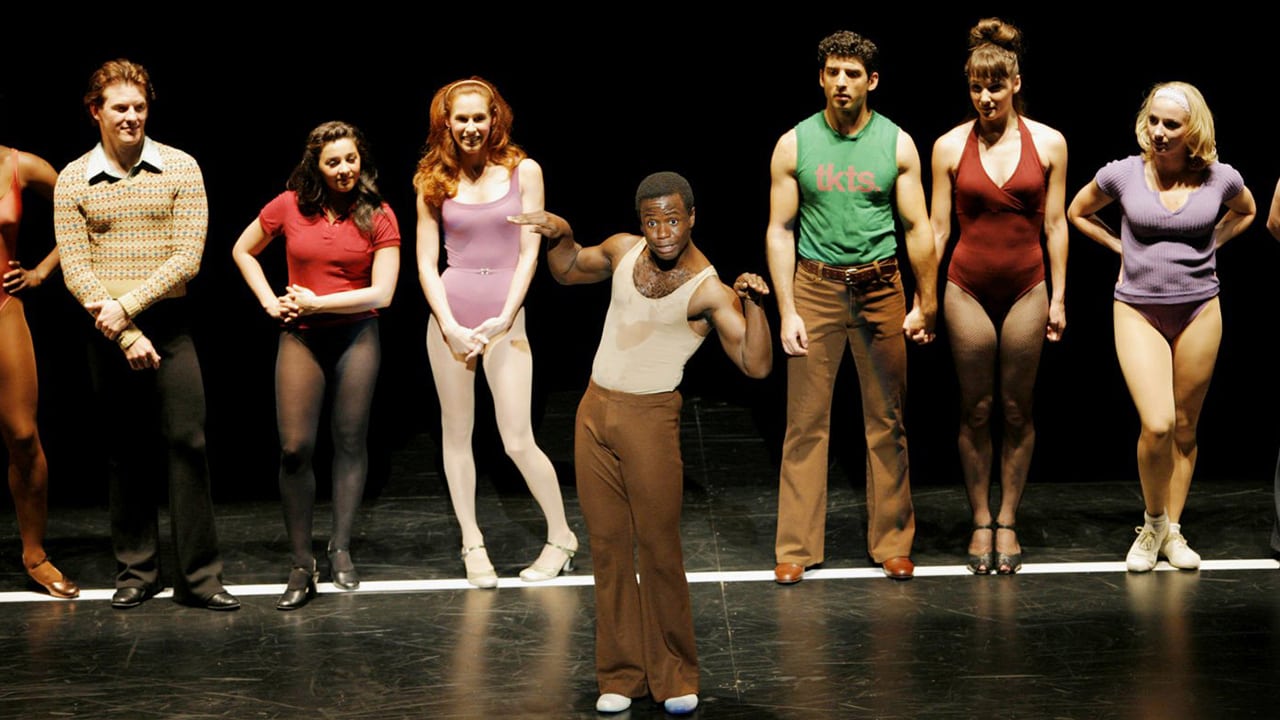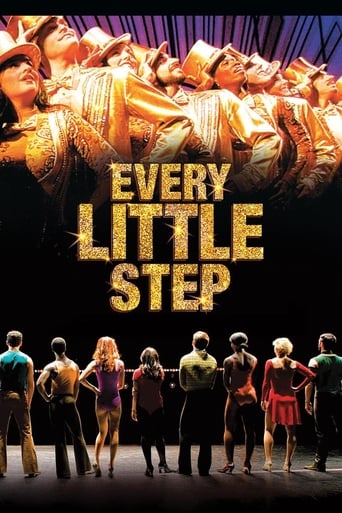



one of my absolute favorites!
I think this is a new genre that they're all sort of working their way through it and haven't got all the kinks worked out yet but it's a genre that works for me.
View MoreOne of the worst ways to make a cult movie is to set out to make a cult movie.
View MoreI think this is a new genre that they're all sort of working their way through it and haven't got all the kinks worked out yet but it's a genre that works for me.
View MoreThis movie delves into the audition process of the revival of A Chorus Line. Warning! You will now want to see the movie and have the songs rolling through your brain ad nauseam...Who knew the audition process took that long! Some of them really screwed the pooch and lost the roles in the process.An interesting look at a well loved and known Broadway play and movie.
View MoreDel Deo and Stern's new film records the tryouts for the 2006 revival of the big Seventies Broadway hit, Chorus Line. Fans of musicals and song-and-dance generally, as well as devotees of the joy and tears of the theatrical life and the fierce competition of Broadway, and certainly anyone who adored the original musical or its revival, will not want to miss this. Others may be left relatively cold by a film that at times tries to tell too many human interest stories, both about the makers of the hit musical (which opened in 1975) and about the experiences of (well some of) the thousands of hopefuls who turned up for auditions four years ago. But the thrill and the excitement are there, as well as the heartbreak. And the sheer fun of witnessing a moment or two when somebody absolutely "nails" an audition, and shows a just-right-for-the-part talent as an actor, singer, and dancer, all at the same time. These sweet-spot moments don't come often, but when they do, they can take your breath away and they can make you weep.Immensely popular and a hot ticket at the time, Chorus Line itself plays to hardcore Broadway show fans. In conventional terms, it's not a play, and it's not a musical either. It's a "chorus line." It is built on the stylized conceit of presenting a literal line, a row of a dozen men and a dozen women ranged like soldiers along the stage in front of the audience who tell stories and entertain by singing, dancing, and, of course, acting. One by one, and in alternation, they tell their stories, which in turn are in some sense the universal stories of show people -- the early talent, the inspiration, the commitment -- the one-way bus ticket to Manhattan with a few dollars in the pocket and a small valise of clothes and a big dream. Bob Avian and Michael Bennett were the original collaborators, with Charlotte d'Amboise and others on the team that put the thing together. The genesis was a series of sessions where a group of dancers got together with Avian and Bennett in a loft with a reel-to-reel tape recorder and a big bottle of bad red wine and blabbed into a microphone about their lives. It was Bennett's belief, which Avian endorsed, that these collective and individual stories could in some way or another be made into a show that people would want to see and that would be exciting and fresh. A show with choreography added and the songs built out of the stories crafted by the gifted composer Marvin Hamlisch.It was a collective process to decide how to make it work. One of the essential tricks was not to be too literal in linking certain testimony to a single voice or character and to keep all the two dozen of the "line" somehow in play. Individual soliloquies were important, and solo songs, and also ensemble song-and-dance numbers. What emerged was a collective picture of theatrical life built out of real individual experiences from the spoken words of the tapes.One of the things that put it across as a show on Broadway was that Broadway fans are fascinated with the individual stories of how real people make it to the glamor and the bright lights, and that this somewhat vérité style of presentation used in the play seemed radical and original and of-the-zeitgeist. Chorus Line was Chorus Line and nothing else. It was at once every musical and no musical ever done before. It fit the somewhat radical taste of the Seventies and also the very Seventies interest in the confessional mode. Because some of the stories were very sad and very personal.You've got to hand it to the film: it thoroughly documents this process of creation, while skillfully juggling the story of the three thousand or so hopefuls who showed up and got gradually whittled down to two dozen for the revival. But beyond this statement, it's very difficult to summarize the film, because too many people are involved. There is an eight-month gap between the original tryouts and the final auditions, and one woman with solid Broadway experience fails because she's asked to recapture the innocence of her first portrayal of the part, and she just can't remember what she did back then.One moment you won't forget is Justin Tam's "tour de force" speech as the gay character Paul, who recounts as a young dancer being hired to play dressed up as a girl, and then discovers that his parents, who don't know about him, have come to see the performance, but do not judge him. Inexplicably, Tam's reading just makes you cry from the first sentence, and he broke up the whole table of audition judges, who applauded him after it was over. Something magical happened for Tam: he had incarnated the role totally and appealingly, and there wasn't much doubt about who would get the role after that. This is the mystery, and also the heartbreak, of auditions. Lots of talent comes in, but even when the sometimes narrow requirements of look and body type and voice, etc., have been met, how can you "hit it" just in those five minutes you get to perform? You don't need much: just major amounts of work, talent, heart, intuition, and luck. And this dedication the film and its participants celebrate.The film seems at its most desperate and uninformative when it edits the performances of a single song and dance by three men -- and the men's auditions are very unrepresented to begin with -- into a single excerpted performance. It tells you nothing about the performers or the song. Ultimately, Del Deo and Stern have too much material to work with.
View MoreI've seen a Chorus Line about a dozen times since my high school performed it in 1978. I've also seen the revival. The music still gives me goosebumps, and I had goosebumps sitting in the theater as they began playing Micheal Bennett's taped interviews from the early 70s when he gathered together a group of dancers and had them talk about their lives, their hopes, their dreams, their aspirations...and what would happen if they could never dance again. That's right...the legendary tapes that any Chorus Line fan knows about but has never heard. If you love this show the way I love this show, you'll find Every Little Step truly fascinating. Jason Tam's audition for the part of Paul was one of the highlights, leaving just about everyone - on screen and off - in tears. I've seen this kid on One Life to Live and never gave him a second thought. Now I have intense respect for his acting skills.How ironic - a film that shows the struggles of dancers trying to earn a place in a show about the struggles of dancers trying to earn a place in a show... It's worth every penny, and I'll definitely buy it on DVD. I highly recommend it to anyone who has seen and loved a Chorus Line.
View MoreI think this was a brilliantly done film. It may have its flaws (Not necessarily crediting everyone properly where credit is due), but that aside, it's a beautiful look in the auditioning process from both the actors' and producers' sides, using a the audition process for the revival of the groundbreaking musical about the auditioning process.The structure of the film is wonderful. This is a documentary that works well, not just as a documentary, but as a film. I suppose that we may be a bit jaded by watching "American Idol" and similar shows which expose some of the auditioning process, this goes a bit deeper, looking at performers who operate at the highest level of work. Some of the audition clips show performances that are astonishing and thrilling. That American Equity Association, the union for Broadway actors, allowed the filmmakers to film the actor/dancer/singers to be filmed, it allowed us to see the audition process for performers such as Charlotte D'Amboise, already a star for her performance in Chicago.That this film goes back to original interviews with Michael Bennett and some of the taping of dancers and actors who spend most of their time on the audition line and expose their inner selves when then perform, it helps us empathize with these performers who aspire to be part of one of the great acting pieces for musical theater performers.The film never sinks to maudlin profiles of the performers, unlike American Idol and the like. That the filmmaker doesn't do this allows us to come to the film. Never did I feel that I was being hit over the head or were the emotions generated undeserved.In addition to the clever device of the watching the audition process for a musical about the audition process, the film really gives you a sense that it's a challenging, grueling process for both sides. And it's incredible thinking about this "interview" process only results in a contract for 6 or 7 months. How would you like to spend 8 months preparing to interview for a job that only may give you 6 months of employment? Finally, the film keeps us in suspense, much the way watching an American Idol episode, so the film works on many, many levels. I'm glad that the producers are correcting some of the credits for the DVD release. Those omissions didn't keep me from being enthralled with this documentary. Anyone remotely interested in theater or musical theater ought to see this film.
View More